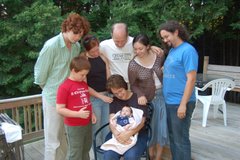When Katagiri Roshi asked Natalie Goldberg what she'd like to come back as in her next life, she playfully answered "a clump of white flowers."
"No, that's too simple," he replied.
"What would you come back as?" she asked him.
"A monk. I would always come back as a monk."
At least that's how I remember the conversation as I was "re-listening" to Long Quiet Highway on audiotape driving on one of my many mind-numbing errands as a mother. On those long, lonely hauls to pick up someone or other from from wherever they may be, I've taken to listening to Buddhist tapes or CDs, something soothing that stimulates calming interior monologue.
But when I asked myself this question, "What would you come back as?" I surprised myself by immediately answering, "I would come back as a mother."
Being a monk is a spiritual path, and I never craved solitude until I actually became a mother. The monk’s path has some appeal to me these days. Yet it's possible to find those jewel-like moments of solitude in the midst of a mother's life cycle. In fact, this week I am home alone in the house I share with my family--the first time ever in 27 years of marriage and 23 plus years of parenting. I have left home for a week, I have traveled alone, but to just stay home alone is another story. This week I’ll get to find out just what kind of an inhabitant I am—of my own space and my own body—when there aren’t a lot of others around stirring the pot.
What is left of the giver, the one who finds in another's suffering her own usefulness (to paraphrase the words of Julia Kasdorf's wonderful poem, "What I learned from my mother") when she is left alone for a spell? Sometimes she finds out through tragedy, through enormous suffering of her own--forced separations, divorce, death, war, exile, accident--to find out otherwise is a gift. Especially on a sun-filled April morning, after a night of heavy rain, the world dew-fresh and last years’ chives sending up new shoots that I have time to gather and chop and sprinkle over the omelet I’ve made for myself, without having to make several others first. A life of such self-focus would become mundane, but a week of this will be as savory as the sprinkle of fresh chives on the omelet—chives that have decided to come back as chives--because they are especially tasty when they are the first fresh garden greens one has eaten in a good six months or more.






















No comments:
Post a Comment